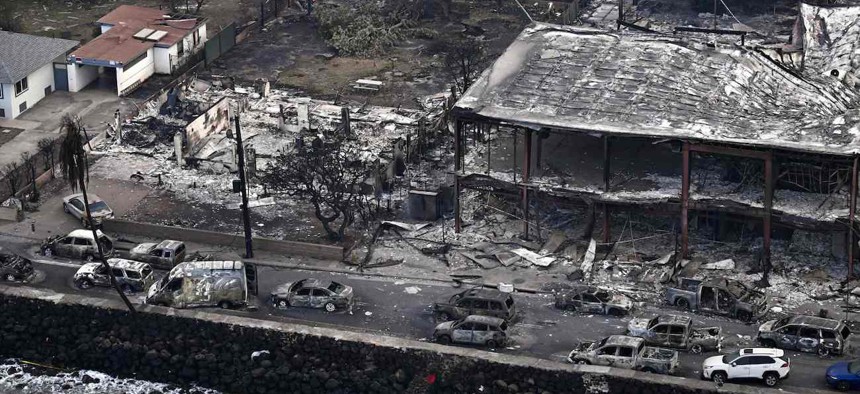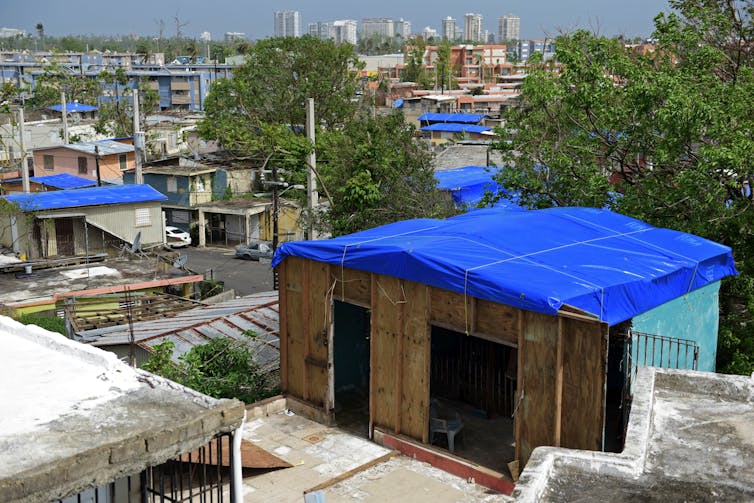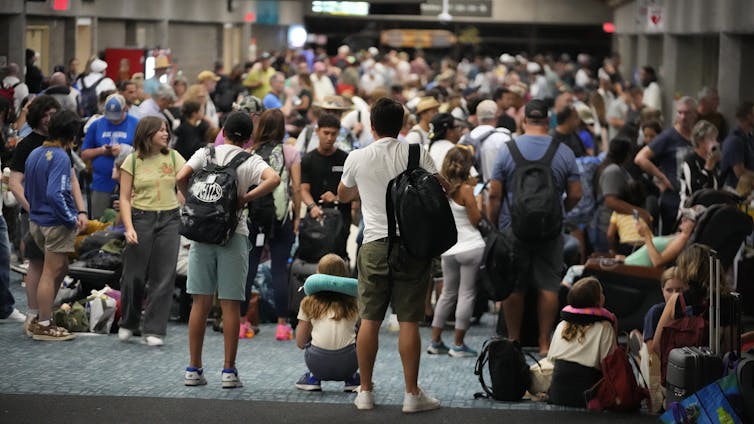
An aerial image taken on Aug. 10, 2023 shows destroyed homes, cars and buildings burned to the ground in Lahaina in the aftermath of wildfires in western Maui, Hawaii. The fires began burning early Aug. 8, scorching thousands of acres and putting homes, businesses and 35,000 lives at risk on Maui, the Hawaii Emergency Management Agency said in a statement. PATRICK T. FALLON/AFP via Getty Images
Maui wildfires: Extra logistical challenges hinder government’s initial response when disasters strike islands
How the U.S. government responds to disasters like these and how Maui’s geography could interfere with aid delivery.
Wildfires destroyed the Hawaiian tourist town of Lahaina on Aug. 8 and 9, 2023, leaving many of its roughly 13,000 residents homeless. Fires also burned in other areas on Maui, Hawaii’s second-largest island, and its Big Island. President Joe Biden issued a disaster declaration on Aug. 10, which authorizes federal aid for communities in harm’s way.
The Conversation asked Ivis García, an urban planner who has researched disaster recovery efforts in Puerto Rico, to explain how the U.S. government responds to disasters like these and how Maui’s geography could interfere with aid delivery.
Is it harder for aid to reach an island than the US mainland?
The Federal Emergency Management Agency, which delivers emergency assistance after disasters, has to deal with big transportation challenges in cases like this. Initially, FEMA will be focused on bringing food, generators, cots, meals and anything else people need, and that aid will be arriving on planes and boats rather than by road.
Later, FEMA might bring temporary homes – often called trailers – but only if there’s enough suitable land to accommodate them. There were not a lot of FEMA-supplied trailers in Puerto Rico after Hurricane Maria struck in 2017. On islands, like Maui, there’s usually not a lot of room to set up trailer parks, whether or not a disaster has just occurred.
Likewise, it will be harder to deploy emergency personnel. Aid workers will have more trouble getting to Maui than they would have arriving in North Carolina, for example. And there could be few places for them to stay. It’s not clear if that’s going to be a problem on Maui, where there were about 26,000 hotel rooms before the wildfires broke out.
Everything about the immediate response to a disaster in places like Hawaii and Puerto Rico is more expensive than on the mainland. That includes food, shelter and transportation. You can’t just drive there or go rent a car when you arrive. There’s typically little public transportation available, and there are few roads even if an aid worker can obtain a vehicle.
When aid does arrive by boat, unloading it can be hard and take a long time. The disaster may have damaged the local harbors and ports, and the harbors in places like Lahaina are usually small and not suited for cargo. Reports don’t indicate that Kahului, Maui’s cargo port, was damaged.
Hawaii is closer to California than Japan but thousands of miles away from both places. Because of U.S. laws, all government-paid assistance needs to originate in the United States. The same is largely true as well for private aid because of the Jones Act, a 1920 law that requires goods shipped between U.S. ports to be transported by vessels that belong to Americans and are primarily U.S.-operated.
The government has the power to issue a waiver of the Jones Act during disasters. Former President Donald Trump issued, a 10-day waiver after Hurricane Maria.
Some members of Congress have sought for years to repeal the Jones Act, at least for shipping to remote places like Hawaii, Alaska, Guam and Puerto Rico, without success.

What can Maui residents expect from FEMA?
Residents of a disaster area may qualify for FEMA’s critical needs assistance – one-time payment that in recent disasters has been for $700.
On top of emergency aid, food and clothing, FEMA will help residents apply for housing aid as needed. FEMA’s housing aid rarely exceeds $35,000; other government agencies sometimes provide further funding.
FEMA usually sets up an assistance center for this, often in coordination with local nonprofits. This process could take several months to get underway, and FEMA also accepts online applications from individuals. In the meantime, displaced residents may get money or vouchers to cover short-term hotel stays.
Lodging costs are very high on Maui, even in normal circumstances. So it’s likely that many local residents will find it nearly impossible to cover their short-term housing costs with their FEMA assistance. That means large numbers of displaced people are likely to relocate to another Hawaiian island or another state with cheaper housing and hotels. Most likely, many of them won’t return.
That’s what happened in Puerto Rico after Hurricane Maria.
Researchers have estimated that of the nearly 400,000 people who left in 2017 and 2018 after Maria, maybe 50,000 had returned by 2019. It’s worth noting that regardless of whether one resides in Maui or elsewhere, FEMA only provides housing support for up to 18 months.
Residents at that point might be making their own houses habitable again. Often, nonprofits pitch in with this work. If residents were homeowners, rather than renters, and had insurance, they’ll eventually get money from their policies to rebuild or, depending on state laws, relocate.
FEMA’s housing aid primarily benefits homeowners, and there’s evidence that low-income people can struggle to get the housing help they need from the agency. Renters sometimes qualify for FEMA grants to cover losses not insured by an insurance policy, such as furniture and other personal belongings.
Renters, business owners, nonprofits and homeowners located in disaster areas can also apply for Small Business Administration disaster loans.
What about tourism?
There were many tourists in Puerto Rico who got stranded after Maria. Their hotels were damaged, and they were evacuated, along with local residents, to shelters. That’s happening in Hawaii now, with the wildfires.

Once those tourists leave, the hotels damaged by wildfire will need to rebuild before the local tourism industry can recover. Many of the people who work in smaller tourism operations will be busy building their own homes before they can focus again on restoring their businesses.
Larger hotels that were damaged, such as the historic Best Western Pioneer Inn, will probably wait for their insurance policies to pay out before rebuilding.
In Puerto Rico, which like Hawaii depends heavily on the revenue it gets as a popular travel destination, it took at least two years for tourism to bounce back because the island’s recovery was so slow and complex.
![]()
Ivis García, Associate Professor of Landscape Architecture and Urban Planning, Texas A&M University
This article is republished from The Conversation under a Creative Commons license. Read the original article.






